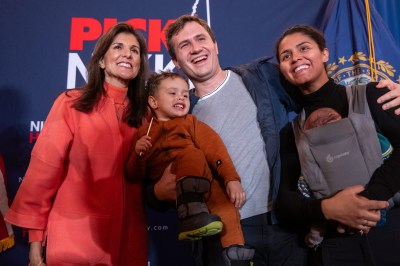MANCHESTER, New Hampshire—Isaac Delaney and Jack Marino aren’t from New Hampshire. They don’t consider themselves Republicans. But the two 19-year-old Dartmouth students have registered to vote in the Granite State and plan to cast ballots for Nikki Haley in next week’s presidential primary.
“Begrudgingly,” Marino told The Dispatch on Monday as the two friends waited in a brewpub to hear from Chris Sununu, the state’s popular Republican governor who endorsed Haley last month. He’s skeptical of some of Haley’s foreign policy views, he said, but made clear that there’s no chance he votes for anyone next week but her.
Delaney, however, was a bit more enthusiastic in his support of the former South Carolina governor than his friend. “I think she’s the only one who has the chance to beat Donald Trump,” he said. “I disagree with her on lots of stuff, like abortion, but …” He smiled and shrugged as his voice faded off, as if to say, What choice do I have? Although he probably wouldn’t vote for Haley in the general election if she made it that far, he said he’d prefer Republicans nominate her than the former president.
Haley herself may be loath to admit it, but she’ll have to count on a lot of New Hampshire voters just like Marino and Delaney—who don’t normally lean toward the GOP but want to boost the candidate with the best shot of taking down Trump—if she hopes to win the state’s primary on Tuesday. Subtly, Haley is attempting to knit together the center-right coalition that has worked to elect Sununu governor four times—and add in some centrist and center-left voters looking for an outlet for their opposition to Trump.
The situation reflects Haley’s precarious position after her disappointing third-place finish in Iowa. To stay alive in the race for the nomination, she will almost certainly have to outright win New Hampshire—a place veteran GOP strategist Pat Griffin called her “Waterloo.” Yet to outpace Trump, she will almost certainly have to rely on support from Democratic leaners and moderates who are planning to turn out for the state’s Republican primary in the absence of a competitive race on the Democratic side.
The Haley campaign initially did not respond to a request for comment on its approach to potential crossover voters, but a spokesperson sent a statement after the publication of this article. “Nikki has always believed that the Republican Party has to be about addition, not subtraction,” it read. “Otherwise, Republicans will keep losing like we did in 2018, 2020, and 2022. If Republicans want to start winning again, we have to start bringing in voters who are fed up with Joe Biden, not pushing them away.”
Griffin told The Dispatch on Tuesday he still thinks there’s a chance Haley can overcome the 13-point gap separating her from Trump in the RealClearPolitics polling average of the state. The recent departure from the race of Chris Christie—whose overtly anti-Trump message had attracted Democratic-leaning voters looking to get in on the fun on the GOP side—could redound mostly to Haley’s benefit, though her unwillingness to go as far as the former New Jersey governor in denouncing Trump means it won’t be a clean transfer.
In Griffin’s view, Christie’s absence gives Haley an opportunity to differentiate herself in the final days of the race. “Do they decide that it’s worth basically taking on Trump a little?” he wondered. “Do they decide that, you know, it’s time to set a couple of things straight?”
Trump and his allies, for their part, seem to recognize the opening Haley has with these voters and have been working to depress the Democratic turnout for her. A new Trump ad highlights Haley’s support for “cuts” to Social Security, and his campaign is buying up time to air it on MSNBC, the cable news network aimed at liberals. Meanwhile, MAGA Inc.—the pro-Trump super PAC—recently sent out mailers to New Hampshire voters who were supporting Christie that play up Haley’s “MAGA” street cred.
Haley’s attempt to build a winning coalition of center-right, moderate, and center-left voters is only possible because of the unique rules that govern New Hampshire’s primary. The state’s nominating contest might properly be called semi-open, meaning that—although registered Democrats can’t vote in the Republican contest—voters with no party affiliation can show up on primary day, seamlessly register as Republicans, and vote. For the truly independent voter, there’s even an option to change your affiliation back to undeclared as you walk out the door of your polling place. Not every undeclared New Hampshire voter is a centrist or moderate; plenty of conservatives and progressives refuse to officially affiliate with Republicans or Democrats, but still reliably vote in that party’s primary. By staying undeclared, however, these politics-obsessed voters can play in either presidential primary, depending on where the action is.
To be sure, these aren’t the only voters that will be pulling the lever for Haley next week. She’s supported by plenty of regular Republicans, and groups like Americans for Prosperity Action—the Koch-funded super PAC—are using mailers, digital ads, and old-fashioned door-knocking to convince traditional conservatives to come out for her. To win, she’ll need to keep longtime Republicans like Merv Newton of Milford—who told The Dispatch he’d probably still vote for Trump if he wins the nomination—on her team.
But just as important to her coalition are voters like Rick and Donna Wright of Whitefield, who came to Haley’s rally at the historic Mt. Washington Hotel in Bretton Woods on Tuesday. The couple are not registered with either party, and while Rick told The Dispatch he leans conservative, both he and Donna have voted in both Democratic and Republican primaries in the past. This time, they say they’re both voting for Haley.
“I’d like to get out of the chaos and the bulls—t from the past,” Rick said before the rally began.
Chuck and Linda Donovan of Bartlett, also at the Haley rally in Bretton Woods, are in a similar spot. Both are formerly registered Republicans who said they couldn’t stomach staying in the party once Trump took it over eight years ago.
“It’s all about him. It’s all about Trump,” Chuck told The Dispatch disapprovingly. The Donovans are enthusiastic about voting for Haley in the primary—they knew before they saw her Tuesday they would be voting for her—but won’t be voting Republican in November if the former president wins the nomination.
Estranged Republicans are one thing. But convincing Democratic-leaning independents to vote in the GOP primary is tough work, and Robert Schwartz knows it. A Democratic activist in New Hampshire, Schwartz is the co-founder and executive director of PrimaryPower, an outside group spending money to target these Democratic leaners and encourage them to support Haley. PrimaryPower does not disclose their donors, but Schwartz says they’ve raised enough to pay for mailers and text messages for the final push. One of the mailers tells recipients to “Help change the channel on Trump—before it’s too late.”
Schwartz has run the numbers and sees a narrow path for Haley, telling The Dispatch that New Hampshire presidential primaries usually see 100,000 undeclared voters show up. But the unusual nature of the 2024 race—President Joe Biden is not even competing in the Democratic primary here, and the challenge from Rep. Dean Phillips is largely viewed as perfunctory—means there’s an opportunity to encourage even more to come out and vote against Trump. If the number of undeclared voters reaches 130,000 next week, Schwartz predicts Democratic regulars will have made up most of the difference—and that they’ll almost all be going for Haley.
Linda Donovan said she knows several such voters. “They’re worried,” she said of her Democratic-leaning friends and neighbors. “They don’t want Trump to get it, you know, no matter what. So they will come out and vote for Nikki for that reason.”
But even tens of thousands of these kinds of voters may not be enough, given Trump’s polling lead in the state. “If you can get 44 percent of the Republican primary to be undeclared voters,” said Schwartz, “then that gets you to an area where Nikki Haley may come within five or ten [points].”
“We view a single-digit loss as an incredible comeback for Haley,” said Schwartz. “Does anyone remember who won the 1992 primary? They only remember [Bill] Clinton was the Comeback Kid.”
Of course, Clinton’s second-place finish in New Hampshire in 1992 was the start of a long slog through multiple primaries and caucuses in which he and three other candidates continued to split up the vote and the victories. It wasn’t until Clinton won eight states on “Super Tuesday” that his comeback put him in the lead for the nomination.
Haley, on the other hand, will continue to face a dominant frontrunner even if she exceeds expectations here in New Hampshire—and another challenger, Ron DeSantis, may stick around and siphon off some of the anti-Trump vote. She will not participate in next month’s party-run caucuses in Nevada, and will have to contend with a Republican primary at the end of February in her home state of South Carolina—where Trump currently has a 30-point lead, and where there’s less of a tradition of strategic voting in the “other party’s” contest.
So even if New Hampshire’s Democratic leaners and independents deliver the state for her, could Haley make it to Super Tuesday?
Editor’s Note, January 18, 2024: This story was updated to include a quote from the Haley campaign that was sent after publication.






Please note that we at The Dispatch hold ourselves, our work, and our commenters to a higher standard than other places on the internet. We welcome comments that foster genuine debate or discussion—including comments critical of us or our work—but responses that include ad hominem attacks on fellow Dispatch members or are intended to stoke fear and anger may be moderated.
With your membership, you only have the ability to comment on The Morning Dispatch articles. Consider upgrading to join the conversation everywhere.